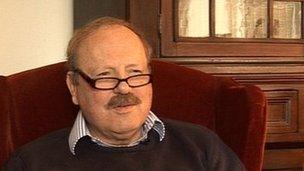Call for vitamin D supplements to tackle Scots MS rates
- Published
Scots have low levels of vitamin D, due to a lack of sunshine
Rates of multiple sclerosis are so "dire" in Scotland that essential foods should be fortified with vitamin D, according to an Oxford academic.
Professor of clinical neurology George Ebers has published a study showing a strong link between the condition and vitamin D deficiency.
He says the Scottish government could face legal action from people who go on to develop MS in future.
Scotland's chief medical officer said trials of supplements were needed.
Scotland has the highest levels of MS in the world and the lowest levels of vitamin D, due to a lack of sunshine and a diet low in oily fish.
Prof Ebers has published the latest study to show a link between the vitamin and multiple sclerosis, but he says efforts to convince the Scottish government and its top health adviser, Sir Harry Burns, that the whole population needs to take vitamin D have come to nothing.
World experts
He said: "I went to see Harry Burns six years ago and I said, 'Look Harry, it's looking like it's going to be vitamin D and you've got a serious MS problem up here, we should keep in touch.'
"Then I saw him three years ago and said the same thing - that more information was coming along. It's been puzzling that it hasn't led to too much action."
Fifteen months ago the advice to the Scottish government was even stronger.
It came not only from Prof Ebers but from a group of world experts in multiple sclerosis and vitamin D who met in Glasgow.
They recommended that the Scottish government consider supplementing the population.
Ministers responded by issuing advice for "at risk" groups such as pregnant women and people with darker skin. Most of these groups remain unaware that they should be taking vitamin D and the Scottish government issued no advice for the general population.
When asked whether people who go on to develop MS in future will be able to accuse the government of inaction, Prof Ebers said: "Absolutely. In fact I think that is going to happen in the future. Inevitably, it's going to happen."
'Important issue'
He said the evidence that low levels of vitamin D can lead to increased risk of multiple sclerosis is now "awfully strong".
Sir Harry Burns said he welcomed contributions to the debate about this "important issue" but that trials of vitamin D supplements in large populations were needed before the Scottish government could act.

Prof George Ebers says the Scottish government must act now to prevent future legal action
He added: "Mass medication of the Scottish population without such evidence would be considered irresponsible by the public health community."
Sir Harry added that he would be guided by the Scientific Advisory Committee on Nutrition which was due to issue new advice on vitamin D in 2014.
But Prof Ebers said 2014 was too long to wait.
He added; "Public health authorities have got to be conservative, that's their nature... but these are equations. You have to compare the cost of action against the cost of inaction.
"Scotland can't afford to look after its existing MS patients. This is an equation which has to be reviewed on a regular basis to see when the right time is and, for many of us, the time has long passed."
- Published8 December 2011
- Published4 October 2011
- Published19 April 2011
- Published24 March 2011
- Published19 September 2010